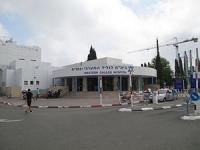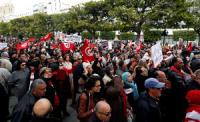-
Why banning laptops from airplane cabins doesn’t make sense
Recent reports suggest that terrorists can now create bombs so thin that they cannot be detected by the current X-ray screening that our carry-on bags undergo. In an effort to protect against such threats, the U.S is considering banning laptops and other large electronic devices in the passenger cabins of airplanes flying between Europe and the United States. This would extend a ban already in place on flights from eight Middle Eastern countries. It is tempting to think that any level of cost and inconvenience is sensible if it reduces the risk of an attack even a little. But risks, inherent in flying and even driving, can never be avoided entirely. So when weighing policies that are designed to make us safer, it is important to consider both their costs and potential effectiveness. Unfortunately, whether the benefits justify the costs is too often not the yardstick used by officials determining whether to pursue these types of policies. Instead, it is more likely that political considerations motivate the adoption of restrictive policies, which in the end actually do little to protect citizens’ security.
-
-
Former Treasury official: Qatar’s terror ties make it a questionable U.S. ally
The ongoing terror ties of Qatar, most recently evidenced by its hosting of Hamas’s release of the terror organization’s new political document, make it a problematic ally for the United States. Hamas is not the only terror group that Qatar has aided. Qatar has overseen the rebranding of the Nusra Front and the Taliban, and has provided luxurious homes for leaders of the Taliban who were released from Guantanamo Bay.
-
-
April 2017 terrorism: The numbers
The House Homeland Security Committee has released its April 2017 Terror Threat Snapshot, which details terrorism events and trends in April 2017. The snapshot is a monthly committee assessment of the threat America, the West, and the world face from ISIS and other Islamist terrorists. The document is produced by the Majority Staff of the committee. It is based on information culled from open source materials, including media reports, publicly available government statements, and nongovernmental assessments.
-
-
Reforms in German army after neo-Nazi terror plot discovered
Ursula von der Leyen, German defense minister said that her department would improve “political education” in the army following disturbing revelations about a far-right terrorist plot. The defense minister’s plans were announced after it became clear that the German authorities had underestimated the scale of far-right extremism problem in the army ranks. The defense ministry said that it was investigating the presence of a neo-Nazi terrorist cell in an army base. Members of the cell were plotting to assassinate senior government figures – and conduct the operations in a way which would direct the blame for the assassination to Muslim asylum seekers.
-
-
Latest issue of ISIS’s magazine promotes new terror tactics
The latest edition of ISIS’s magazine offers alarming new terror tactics for jihadis and is threaded with a strong anti-Christian focus. The new Rumiyah justifies attacks against Christians and encourages ISIS supporters to get hold of guns where possible and lure victims for attacks via online ads. Another section in the magazine, titled “Just Terror Tactics,”, serves as a “start-up guide” for lone wolf attackers, presenting a novel use for the internet and promotes several tactics.
-
-
U.S., rejecting Turkish opposition, to arm Kurdish militia ahead of Raqqa battle
The Trump administration has decided to arm Syria’s Kurdish fighters because it was “necessary” for recapturing the ISIS stronghold of Raqqa. The decision was made in the face of fierce opposition from Turkey, a NATO ally which regards the Syrian Kurds as terrorists. Turkey has been worried that a better-armed Kurdish militia — known as the Kurdish Peoples’ Protection Units (YPG) – would be in a stronger position to aid the PKK, a Turkish Kurdish group agitating for greater Kurdish autonomy in eastern Turkey. The YPG leads the Syrian Democratic Forces, or SDF, a multi-ethnic armed militia. Turkey was willing to agree to the arming of the non-Kurdish elements of the SDF, but the Pentagon concluded that without the YPG, the SDF would not be an effective fighting force.
-
-
Israeli hospital takes lead in treating Syria’s wounded

The Western Galilee Hospital, which is located in Nahariya on Israel’s northern Mediterranean coast, is situated just a few kilometers away from the Lebanese border, and has become a sanctuary for victims of Syria’s brutal civil war.According to Israeli officials, the country has so far quietly taken in more than 3,000 Syrians.The medical care provided is free of charge and hospitals do not discriminate on grounds of politics and religion when it comes to admittance.Aside from the humanitarian aspect to saving those wounded in the war, cooperation with rebel groups near Israel’s border also affords Israel a measure of protection.
-
-
The security problems now facing Emmanuel Macron, France’s new president
Emmanuel Macron emerged from one of the most brutal and eventful election campaigns in recent European history as France’s next president. Macron has promised to increase security spending, strengthen internal security services and introduce new centers to integrate people returning from fighting for so-called Islamic State. But solving the riddle of France’s recent security woes is going to require wide-ranging action and reform. This will present the new president with one of the biggest challenges of his presidency. Macron will need to tackle the chronic, daily, security issues France faces and overcome the institutional atrophy and social marginalization which are such powerful drivers of insecurity. There is a reason, however, that previous administrations have not tackled these issues: they are politically explosive and economically costly. In a presidency that is already looking crowded with political challenges and policy promises, where building a broad base of support without a party after the parliamentary elections in June looks difficult at best, there is a risk that these issues will be once again pushed to the back of the queue.
-
-
U.S. kills ISIS top commander in Afghanistan
Abdul Hasib, ISIS’s leader in Afghanistan, was killed by U.S. Special Forces in the eastern province of Nangarhar. American and Afghan officials said that the operation, in which Afghani forces also participated, was conducted last month. Hasib, who last year replaced Hafiz Saeed Khan – who had been killed in a U.S. drone strike – was behind several high-profile attacks, which included an 8 March attack on the main military hospital in Kabul.
-
-
Pentagon looks at new evidence of military cooperation between Iran and North Korea
The Pentagon says that a submarine used in the failed underwater launch of a cruise missile last week by Iran, draws attention to Iran’s military cooperation with North Korea. When Iran used a “midget” submarine for the underwater launch of a Jask–2 cruise missile this week, U.S. Defense Department officials said that it was based on the North Korean Yono design. This was seen as further evidence that the two nations are sharing military technology.
-
-
Integrating radical fighters who return home isn’t easy, but can be done

Thousands of youths have been recruited by terrorist groups from Africa, the Middle East, Europe, Asia and America. Between 2011 and 2016 the number of “foreign fighters” rose to more than 42,000 – among them 5000 Westerners and close to 7000 North Africans. They had travelled to the Middle East to join jihadist organizations such as the so-called “Islamic State” (IS) and the Syrian Fateh al-Sham Front (ex-Al-Nusra), a former al Qaeda affiliate. By early 2016, almost a third of these foreign fighters had returned to their countries of origin. Now that IS is suffering serious military setbacks, the flow of foreign fighters seems to have dwindled. More returnees can be expected to follow in the near future. How should governments manage these returnees? What the available evidence suggests is that governments must respond realistically to a complex problem. And they need to accept that opting for the reintegration of (former) terrorists to minimize the possibilities of future violence is not adopting a soft approach. Realistically, it’s the only approach.
-
-
Some visa applicants would be asked to provide five years’ worth of social media posts
The State Department is planning to ask people who apply for visas to live and work in the United States, to allow government officials to review their social media post going back five years. The State Department will also ask applicants for their email addresses and phone numbers, and for their work and travel history during the previous fifteen years. Applicants will also have to provide the names and dates of birth of immediate family members. The new measures would apply only to individuals who have been identified as requiring additional security screening – for example, people who have travelled to countries and areas where known terrorist organizations are active. The State Department estimates that the new policy would apply to about 65,000 people a year, or about 0.5 percent of visa applicants.
-
-
New evidence shows pattern of Assad regime’s use of nerve agents
New evidence supports the conclusion that Syrian government forces have used nerve agents on at least four occasions in recent months: on 4 April 2017, in a chemical attack on Khan Sheikhoun that killed at least ninety-two people, and on three other occasions in December 2016 and March 2017, Human Rights Watch said in a report released yesterday. These attacks are part of a broader pattern of Syrian government forces’ use of chemical weapons. The attacks are widespread and systematic, and in some cases have been directed against the civilian population. As part of the evidence showing these attacks have become widespread and systematic, the detailed 48-page report identifies the three different systems being used by the Assad regime to deliver chemical weapons.
-
-
ISIS militants apologized to Israel after exchange of fire: Former Israel defense minister
Last November, ISIS-affiliated fighters apologized” to Israel after attacking Israeli soldiers on the Golan Heights. Israel’s former defense minister Moshe Ya’alon referred to an incident in which Islamist militants affiliated with ISIS exchanged fire with Israeli soldiers on patrol along the Israel-Syria border.
-
-
Explosions rock Damascus Airport following cargo flights from Iran
Explosions rocked the area near Damascus International Airport early Thursday morning following the arrival of four cargo planes from Iran. Israeli leaders have said that Hezbollah receiving game-changing weapons, such as advanced missiles or chemical weapons, represents a “red line” that Israel will not accept.
-
More headlines
The long view
What Does Netflix’s Drama “Adolescence” Tell Us About Incels and the Manosphere?
While Netflix’s psychological crime drama ‘Adolescence’ is a work of fiction, its themes offer insight into the very real and troubling rise of the incel and manosphere culture online.
